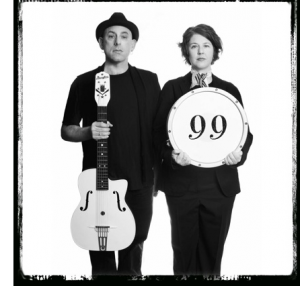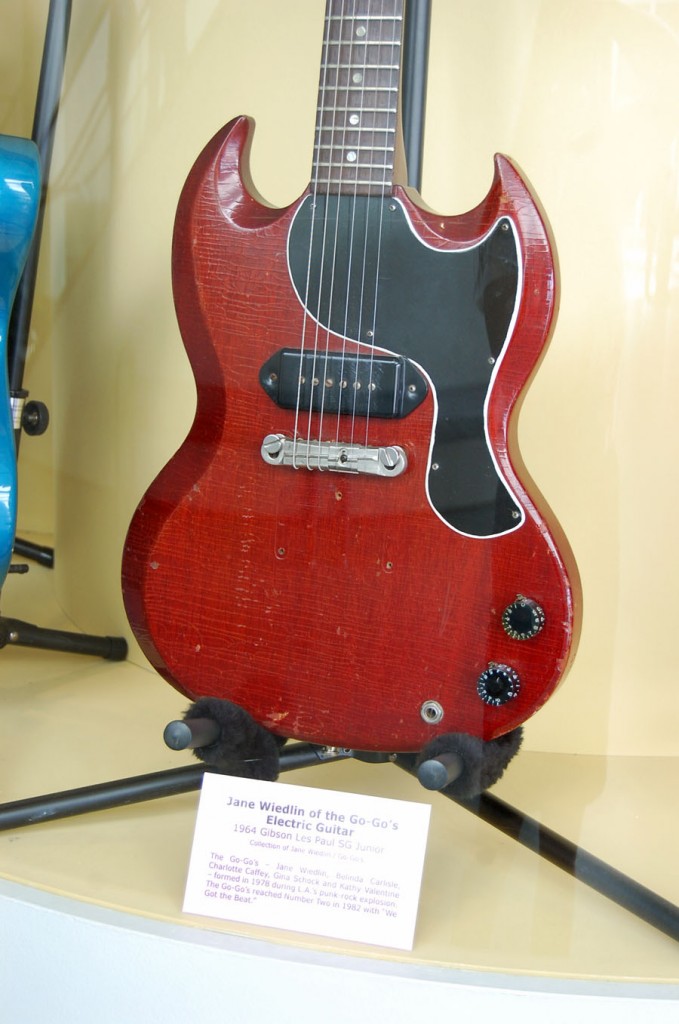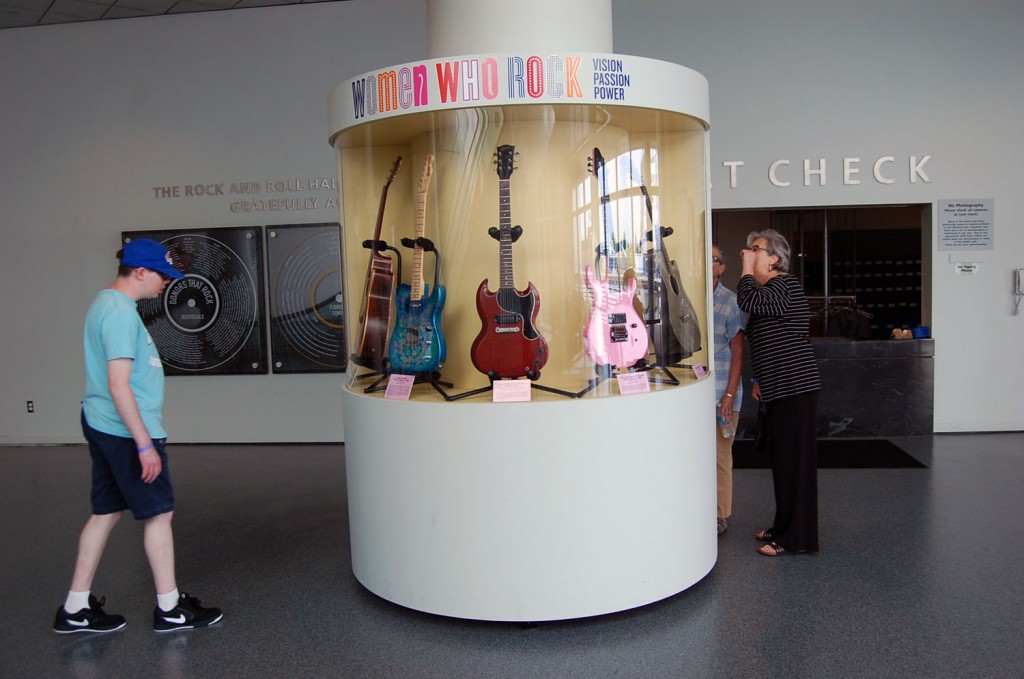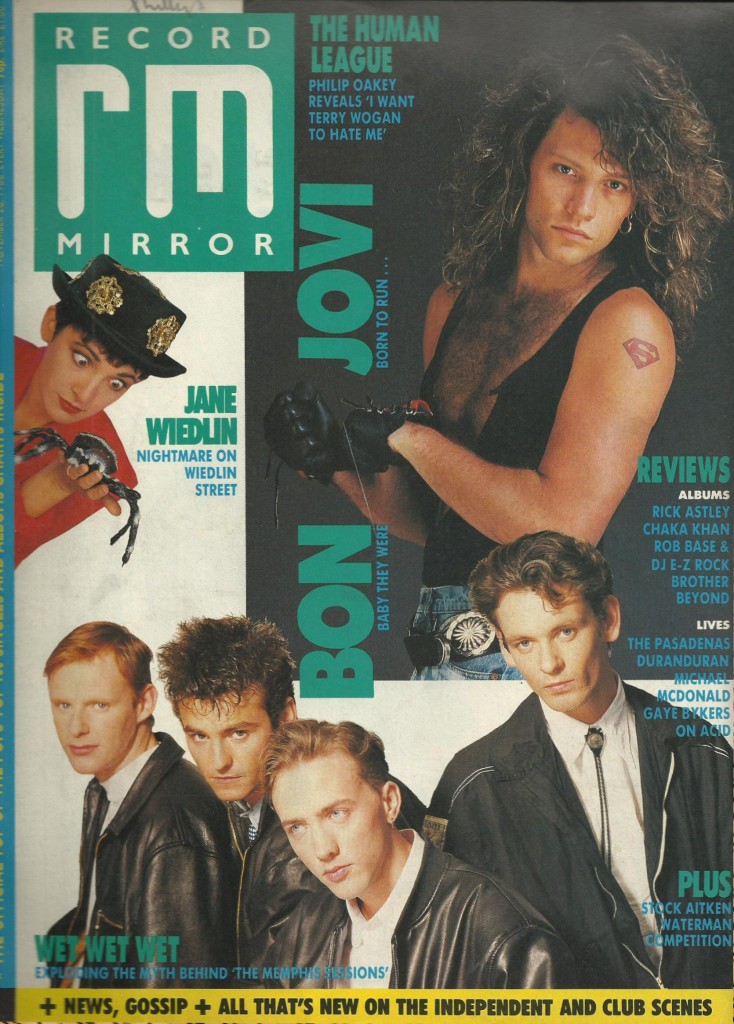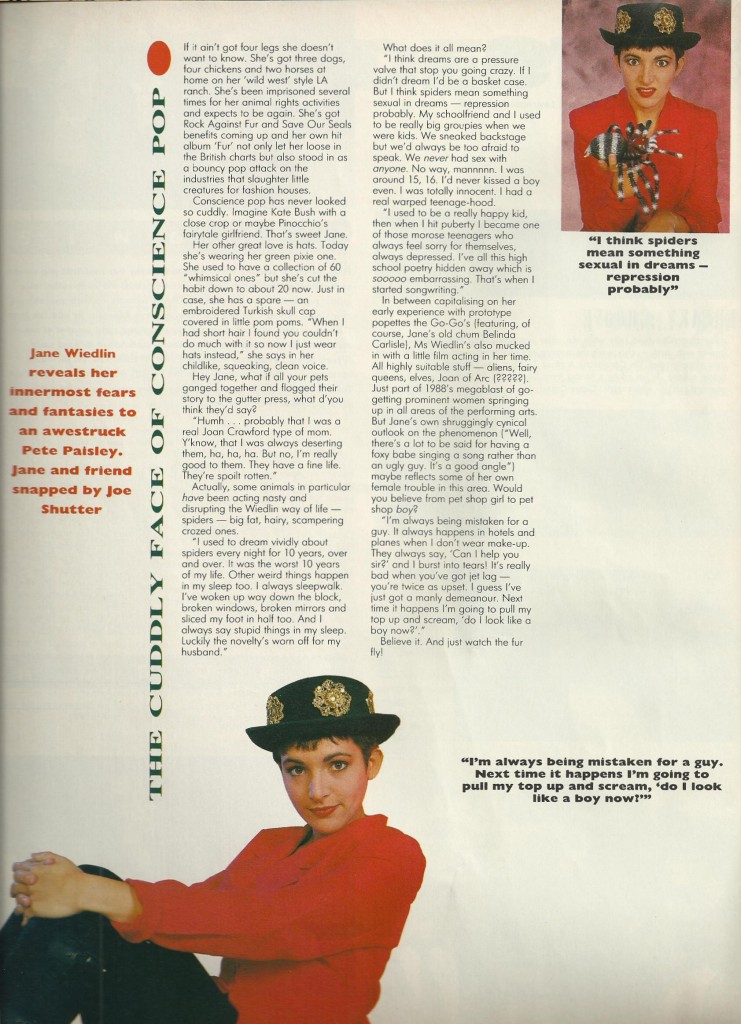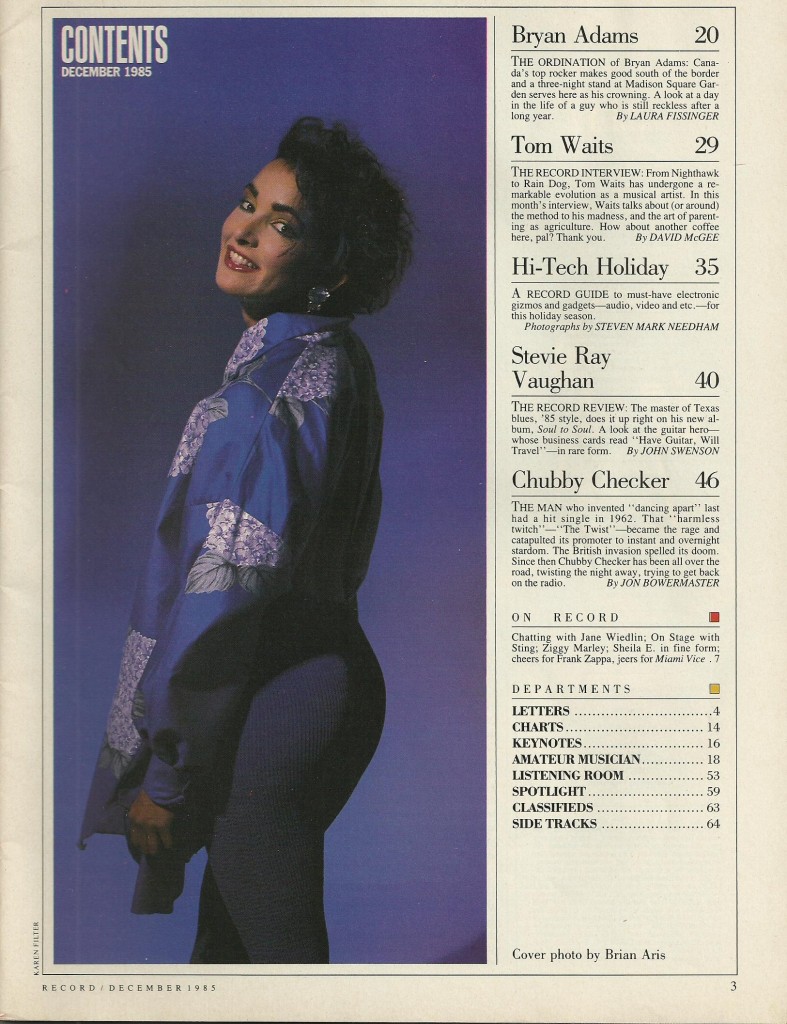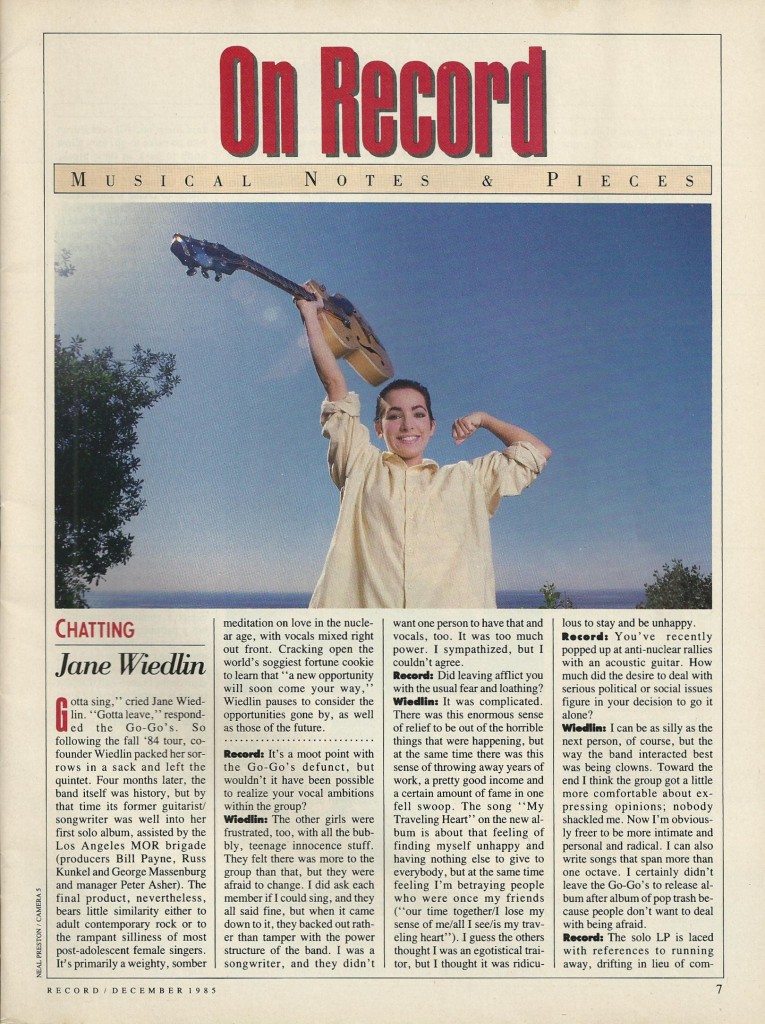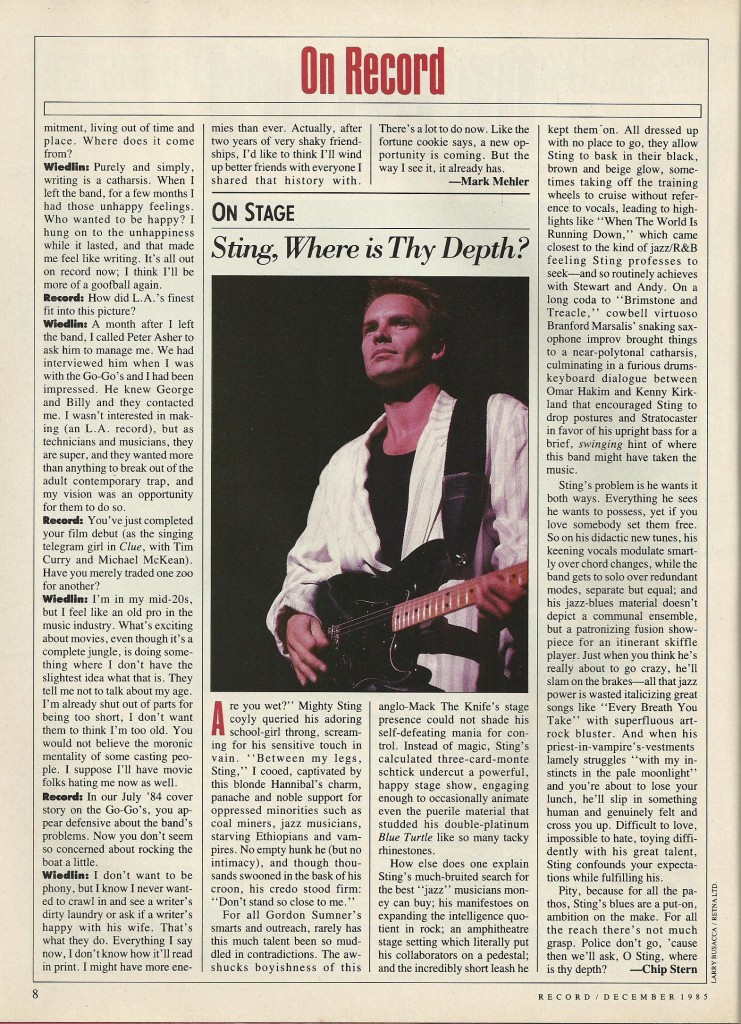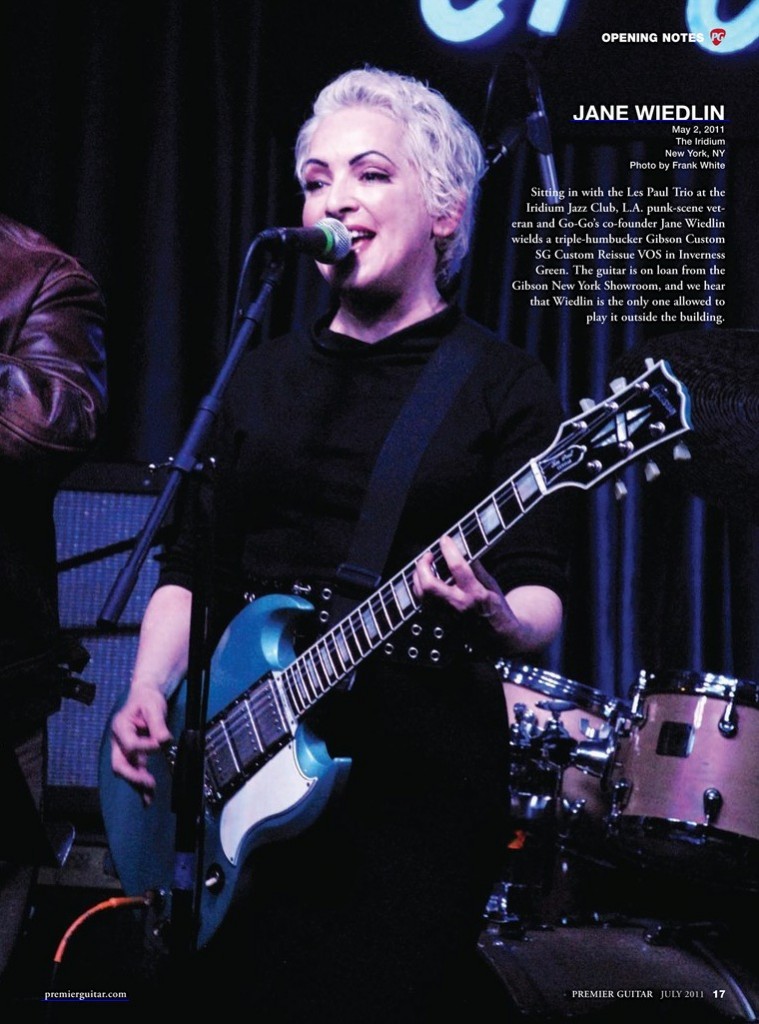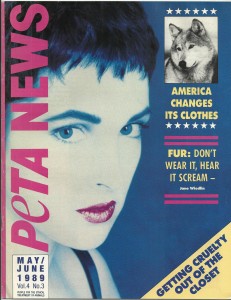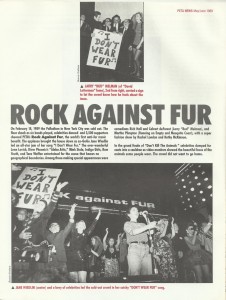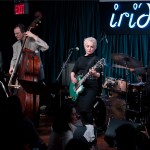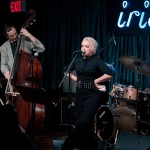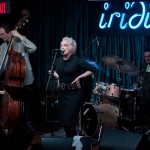Jane’s LA loft is for rent!
Contact – E-mail or call Ted (877-4LA-LOFT) Loft Living LA for more info.
Mental 99 + Go-Go = ?
New SadSadConversation with Jane
For more sadsadcoversations go HERE.
New interview w/Jane
New interview with Jane and AVclub.com by Sam AdamsMore Set List
In Set List, we talk to veteran musicians about some of their most famous songs, learning about their lives and careers (and maybe hearing a good backstage anecdote or two) in the process.
The musician: A founding member of the Go-Go’s, Jane Wiedlin wrote or co-wrote some of the group’s biggest hits, thrusting them into the charts in an era when an all-female band was, for better and worse, still a novelty. For three glorious years in the early 1980s, the band’s superficially breezy yet sometimes lyrically dark songs ruled the airwaves, as well as the nascent medium of music television. Their image was squeaky-clean, all slumber parties and water-skis, but their roots were in Los Angeles’ punk scene, where they built up an audience for years before forcefully going pop. After breaking up and reforming several times, the Go-Go’s were set for a farewell tour last year when Wiedlin suffered a hiking accident—she literally fell off a cliff. Now, with a 30th-anniversary edition of their landmark album Beauty And The Beat in stores, the Go-Go’s have decided to keep things going; they’re still touring, but not saying goodbye just yet. When she isn’t being a Go-Go, Wiedlin is a prolific solo artist and songwriter-for-hire—she and bandmate Charlotte Caffey contributed to the excellent soundtrack of the Josie And The Pussycats movie—as well as a comic-book writer, fetish model, and animal-rights activist.
“Robert Hilburn†(unreleased, 1978) – The A.V. Club: The Go-Go’s had a whole life, and repertoire, before the Beauty And The Beat era. There are bootlegs of you playing at the Whiskey A Go Go as far back as 1978, including several songs that never saw the light of day. Do you remember “Robert Hilburn,†which slagged off the music critic of the Los Angeles Times?
Jane Wiedlin: Oh, nice one! Of course. I remember all those songs. I mean, I had just become a songwriter. The Go-Go’s were like my first babies. Robert Hilburn was a sort of L.A. legend. He was a rock-music critic. “Robert Hilburn†was a scathing song about him. It’s kind of a dumb move for a young band trying to get somewhere, to actually criticize Robert Hilburn, but I don’t even know if he ever heard about it. Or if he did, by the time he heard about it, we were doing so well that he didn’t dare not like us.AVC: What did he ever do to you guys?
JW: No, no, he didn’t ever do anything to us, I think it was more me observing as an outsider. It wasn’t that he actually criticized us. I was just saying he was a poser—which, back in the ’70s, was the biggest insult you could put on someone.AVC: You also called him old, which is just as bad.
JW: Well, the first line of the song is “Robert Hilburn wants to be young.†[Laughs.] It was “Robert Hilburn wants to be young / Robert Hilburn has his tongue-in-cheek pose down real pat, wonders what it’s like to have fun.†That was the first verse. Can you believe I just pulled that out? Come on.AVC: That’s impressive. I had to look the lyrics up on the Internet, since they’re hard to discern on the bootleg.
JW: There are lyrics of it on the Internet somewhere? That’s awesome.“Living At The Canterbury†(1979, released on 1994’s Return To The Valley Of The Go-Go’s) – AVC: It’s striking how much of the retrospective Return To The Valley Of The Go-Go’s is devoted to the band’s punk days, well before you cut your first single. Was there a desire to correct the record?
JW: I think that yes, we have always had a compulsion to try to make people aware we did exist before we became America’s sweethearts, that we came from a very, very specific scene that we were an integral part of. People can call us pop wusses all they want, but basically, we started that band with no experience, no education, no hopes of getting anywhere. To me, it’s a real American success story that we got somewhere, and we like to honor our roots.AVC: “Living At The Canterbury†is explicitly about that scene.
JW: I can’t believe I remember this too, because I can’t remember what I ate for breakfast, but I remember the lyrics to that song. It was “Living at the Canterbury, fighting off the roaches / like living in a dormitory until rental due approaches / Don’t know how we’ll get the cash, we spent it all on beer / I don’t know, but sometimes it’s better not to care, and sometimes I don’t like to care.†Something like that. Anyways, yes, it was a very punky anthem. Here’s the thing—when we started, I was all about the punk anthem and criticizing other people and the word “angry†and all that stuff. I’m still pissed off and stuff, but I just kind of got over criticizing people in songs, and we naturally started progressing to being, I don’t know, I would say more personal and introspective and much less political, even though, in my personal life, I am more political than ever.AVC: Who was living with you at the time when you were writing that song?
JW: In my apartment, I was living with Terry Graham, the drummer of the Bags. Belinda lived with Lorna Doom [of the Germs] in another apartment in the building. Was it just us two? I can’t remember if Margot [Olaverra], she’s the [Go-Go’s] original bass player, ever moved into the Canterbury. I remember her living in a place around the corner. But the Canterbury was completely filled up with punk rockers. It was like, one of us got in, and all of us moved in. And the other people living in the building with us were people on SSI, which I don’t even know exists anymore, but it was money you could get if you could prove to the government that you were crazy homeless people living on welfare, bag ladies. There was this bag lady, she was crazy, she had to be in her 80s or 90s. She wore this weird thing on her head that made her look like a pinhead. She had a tall pointy head. This is so awful, but it’s funny, too. When she died, I was sad that she died—I mean, she was this little old lady—but face it, people die. And as a punk rocker, I snuck into her apartment and stole some of her clothes. I still have one of those dresses.AVC: At least it’s served you well over the years.
JW: I know. If I believed in hell, I’d definitely be going there.AVC: If that’s the worst thing you’ve done, you’re in good shape.
JW: She was dead, it’s not like she could take it with her.“How Much More†(from 1981’s Beauty And The Beat) – AVC: Was there a song that changed the direction of the band?
JW: Yes, totally, I remember the moment, too. Charlotte [Caffey] wasn’t in the band the first few months. Each time we got a new permanent member—Charlotte, then Gina [Schock], then Kathy [Valentine]—it really radically changed the band. When Charlotte joined, she first of all was a real musician; she’d gone to college, musical college, studied piano, she knew how to read music, all this stuff that we didn’t know how to do. But she also brought with her a pop sensibility she wasn’t afraid to show. I mean, I’d grown up loving pop, but once the punk movement started, I was fully committed to punk, even though of course, there still was always that pop-punk blend like Buzzcocks, which we worshipped. Anyway, Charlotte comes in, and Charlotte and I immediately click on a writing level, and immediately start writing together. The first thing we write is “How Much More,†which is still one of our all-time poppiest songs. After that, it became a mixture of pop and punk, and I think by the time we made our record… I mean, nowadays, everyone would hear those records and go “There’s nothing punk about it,†but believe me [Laughs.], at the time, it was still punky. Then the media came up with the term “new wave,†which described poppier but new music that came post the beginning of the punk phase.AVC: How do you and Charlotte Caffey write together?
JW: It was super-magical, because she would have had some chord progression or guitar line in her head, and I would have had some lyric idea in my head, and we would just sit down and barf the ideas out together, and they would just meld together magically. The melody would just kind of create itself bouncing between the two of us, and we would write those songs in minutes, you know? My whole career, I’ve said this over and over, the best ones just come right out of you really quick. Like a good poo. That’s so gross.“Lust To Love†(from 1981’s Beauty And The Beat) – AVC: Where did that one come from?
JW: Where it did it come from? I don’t remember, some boy I was obsessed with. I was a very romantic, overly dramatic young lady, which served me well as a songwriter. Especially as someone who had to focus on lyrics and melody, because if you’re a dramatic and romantic person, lyrics come easy, and you turn every single short-term relationship into the biggest Romeo-and-Juliet story ever. To be honest, I don’t even remember who I fell from lust to love into, it happened so often. [Laughs.] I do remember the song “He’s So Strange.†I still like that song a lot. It’s broodier-sounding than a lot of the Go-Go’s songs. I remember that one was about this guy that both Charlotte and I were seeing, but we didn’t really know we were both seeing him. He was a very dark, mysterious punk rocker. One of the punks, and unfortunately became a heroin addict, and he’s actually dead now. But I was very attracted to that darkness, and bad boys, even though luckily I never became a drug addict. Praise dog.AVC: There’s a dark quality to “Lust To Love†that’s easy for people to overlook if they just listen to the songs and not the words.
JW: One of the trademark writing styles of the Go-Go’s is that we like to take pretty melodies or poppy, upbeat-sounding melodies and pair them with down lyrics. People would always tell us how good we made them feel, and we’d be like, “Really? Because that’s kind of a depressing song.†If you really listen, the lyrics are all us just being depressed and stuff. [Laughs.] But then it’s really happy, so that’s fine. It’s good to mix stuff up. I was going to say—and this is a really dumb analogy, but I’ll just say it anyways—it’s like with clothes. If you wear really tight pants, you should probably wear a bigger shirt. Or if you wear a really tight shirt, you wear baggy pants. It shouldn’t all be tight or all be baggy. And it’s the same way with music.“Fun With Ropes†(1979, released on 1994’s Return To The Valley Of The Go-Go’s) – AVC: “Fun With Ropes†plays very differently in retrospect, now that you’ve done cover shoots for Fetish magazine. Is that what was going on in that song at the time?
JW: Yeah. I discovered I was pervy as a teenager, and for a long time, I was very ashamed of it and held it in. In fact, the only public evidence of that is that song, because I thought I was a freak. Then at some point in the ’90s, I met some people that were outwardly kinky, and totally proud to be it, and I discovered the whole world of the fetish lifestyle, and I was like, “Oh, so I don’t have to be in the closet about being kinky.†So I’ve been an outward kinkster for a while now. But yeah, definitely, “Fun With Ropes†is all about bondage, and a super-funny song that was still loved. Belinda still loves to sing that song, which I adore about her.AVC: It’s funny and edgy. Bringing the Cub Scouts into it, I’m sure they were delighted about that.
JW: [Laughs.] I don’t know if they ever heard about that. Maybe I should send it to them.AVC: Was the song giving voice to something you couldn’t put your finger on before then? Did it crystallize things for you, or did you know what you were writing about?
JW: Oh no, I knew what I was writing about. I think it’s pretty obvious I knew what I was writing about. I think, though, at the time, if you had asked me, I wouldn’t have admitted it. It would have been like, “That’s just a story.†Like I said, I was really in the closet about all that stuff at the time. It was a lot naughtier back in the ’70s. That stuff was really, really something people didn’t talk about. But that’s sort of the punk ethic too, to bring up uncomfortable things.AVC: In the context of the punk scene, there were a lot of people saying things like that just to shock people, and not necessarily revealing anything about themselves.
JW: Exactly. And I think that’s where I had my comfort level, that I could just claim it was shocking, and just a story.“Our Lips Are Sealed†(from 1981’s Beauty And The Beast) – AVC: The “Hush, my darling†bridge in “Our Lips Are Sealed†is probably the most purely beautiful moment on any Go-Go’s record.
JW: It’s so sparkly. Every time we get to that part, I get this image in my head of multi-colored sparkly fairies flying around. [Laughs.] What’s your question?
AVC: You co-wrote the song with Terry Hall, singer of The Specials, and it’s essentially about the fact that he was cheating on his girlfriend with you.
JW: Yeah, well, I have to give credit to Terry Hall, because he’s the one that started the lyric, and I picked up on it and finished it and wrote the music and stuff. But it wouldn’t have happened without him. And it is kind of interesting that it’s about both of us, and both of us had a hit with it, and yeah, it’s kind of cool. When I think back on my life, sometimes I’m like, “Wait, that’s really my life?†Because that’s something I would totally admire in somebody else’s life, that they did that, or that they had that in their life. So I’m lucky. [Laughs.]AVC: Was it strange to have a song that’s so personal end up on the radio everywhere?
JW: No, actually, that’s a good point. Because what I’ve found—and the older I get, the more I understand this and stand behind it—is, my whole life has been an exploration of telling the truth. It’s scary to be truthful, and it’s scary to reveal yourself, and I’m very attracted to doing things that scare me. I think when you take chances and do things that you don’t want to because they’re frightening, that things happen as a result. Exciting things, or you glow. There’s usually good consequences, unless you’re scared of jumping off cliffs and you jump off a cliff, which of course would be incredibly stupid. It’s psychologically and emotionally scary things, not physically dangerous things.AVC: How’s your leg doing?
JW: Oh, I still have a limp, but whatever, I’m alive, and that’s the main thing, right?“But For The Grace Of God†(from 2001’s Keith Urban) – JW: Oh, nice one. I never, of course, would have met Keith Urban, because, first of all, he’s from Australia, and second of all, he’s a country artist. But my husband at the time worked for his managing company, so that’s how I got the chance to write with him. “Grace Of God†was written in 15 or 20 minutes. He is possibly the finest guitarist/singer I’ve ever worked with. The guy is musical right down to his flesh and blood. Music is him. And so it’s super-easy to work with him. I just sort of worked out the lyrics, and he worked out—Charlotte was there too, I don’t want to sound so mean. The three of us, we just sort of bounced these ideas off, we came up with the song. He promptly forgot about the song, because he was working with dozens and dozens and dozens of people at the time. He was making his first solo record. It wasn’t until they were almost finished with the album and they needed one more track to fill out space that his publisher said, “Oh what about that song you wrote with those Go-Go girls?†And they pulled it out, and he decided, “Okay, let’s give that one a try.†I mean, I don’t think he thought anything, and then the next thing you know, it was his first hit, and it went to No. 1. So go figure.
AVC: Lucky for him.
Women Who Rock!
Jane’s 1964 Gibson Les Paul SG Junior guitar has been added to the Women Who Rock display at the Rock N Roll Hall of Fame!!
Click photo to see larger more readable version.
Nightmare on Wiedlin Street
Jane and The Simpsons
 This year’s Treehouse of Horror comic features a story by Jane Wiedlin…
This year’s Treehouse of Horror comic features a story by Jane Wiedlin…
Read rest of the article HERE.
From the vault!
Opening Notes
Jane is in the Opening Notes page of Premier Guitar Magazine.
SadSadConversation with Jane
Adult-Running-Away-From-Home…
For more sadsadcoversations go HERE.
From the Vault
B.O. and Vertigo
Watch more Sad Sad Conversations HERE
How to find due North…
Watch more Sad Sad Conversations HERE
Jane’s hampster wheel is tired …
Watch more Sad Sad Conversations HERE
Jane has sad feet …
Jane Wiedlin is super duper sad on the Sad Sad Conversation channel…
Watch more Sad Sad Conversations HERE
New interview with Jane
New interview with Jane over at StarTrek.com
It’s every Star Trek fan’s dream to appear on screen in an episode of Star Trek or in one of the films. It was Jane Wiedlin’s dream and, unlike so many of us, she got to live it. Wiedlin popped up briefly – about eight seconds – in Star Trek IV: The Voyage Home. That’s Wiedlin as Trillya, the funky-haired U.S.S. Shepard communications officer, sending a distress call that’s glimpsed on a viewscreen at the beleaguered Starfleet Headquarters. Of course, Wiedlin was no stranger to the entertainment industry back in 1986. She’d already topped the charts as a member of The Go-Go’s and had made her acting debut a year earlier, as the Singing Telegram Girl in the movie Clue. In the years since, Wiedlin has continued to sing, solo and with the reunited Go-Go’s, and also to act, provide voiceovers for animated shows, launch a comic book and more. It happens to be Wiedlin’s birthday today, and we thought the occasion would make for the perfect time to catch up with Wiedlin for an exclusive StarTrek.com interview. Happily, she agreed and here’s what she had to say.
How big a Trek fan were you growing up?
Wiedlin: Oh, my God! Star Trek was the highlight of the week for my family when I was growing up. I have older brothers and sisters, otherwise I don’t know if I ever would’ve heard about the show. But we watched every episode when they were originally aired, and then we would recreate the episodes. We even made our own Star Trek movies with Super 8 cameras, and I’d kill to get copies of those films. I don’t know what became of them. But, yeah, I’ve been a geek girl since the 60’s. It’s funny, because there’s been a flame war on Twitter. It started with this one guy who said that female celebrities pander to geeks to get work. A lot of my friends are going crazy about this, how unfair it is. I know so many women who are geeks and it’s like, just because we have boobs doesn’t mean we can’t be geeks. So I’m definitely old-school geek. I was geek before it was cool to be geek and before most of these geeks were even born.
What is it that you most appreciate about Trek?
Wiedlin: The subliminal thing that got to me, that I didn’t really think about until years later, when I analyzed it, was just the positive vision of the future. All races got along. There was no question of race anymore. I don’t know that in the future people are more enlightened, instead of less enlightened, but everything seemed to point toward a better future rather than a worse future. That resonates with me because I can be kind of a depressed person and I worry about the future. I think Star Trek made me feel good. And, just in general, there’s something about science fiction that appeals to me in a huge way. I’d say that outside of music it’s probably been one of the most influential things in my life, in every way, even guys I date. I fell in love with Spock when I was eight years old and I’ve always been attracted to that sort of brainy, stern kind of guy. That sounds so ridiculous! But it’s been influential in the way my house is decorated and the clothes I like.
Let’s talk about Star Trek IV. How did the opportunity to be in it come about?
Wiedlin: I had just gone solo from the Go-Go’s. I had a new manager and he was trying to think of new things for me do besides making pop music. He suggested I try acting and he got me an agent, and I started doing auditions. When I heard Star Trek IV was going to be made I freaked out and just basically begged, begged, begged. I said, “Please get me in that movie. I don’t care who I am in it. I don’t care if I’m wearing an alien mask and you can’t see it’s me. I just need to be in a Star Trek movie.†They did that and, luckily, the casting agent had a good sense of humor and I did get that little part. And it was one of the highlights of my career to be directed by Leonard Nimoy, even if it was just for a few minutes. It was so thrilling.
What details, 25 years later, do you remember about your day on set?
Wiedlin: The uniform I wore was 100 percent wool, so it was very thick, very hot. I was uncomfortable. I was at Paramount and they had these little boxes that basically looked like small storage rooms, which were for the day players. I love that, such an old-school term, day players! So I was uncomfortable and hot and just hung out and hung out and hung out in this room for hours, getting more and more nervous. Finally, it was time for my moment. I remember going on set and Leonard being there and walking me through it. He was a really kind and proactive director. A lot of directors don’t direct you. They just set up their shot and say, “Go.†Leonard led me through my lines and told me what he wanted. I’m sure I was terrible. I hate to say that because I know I’m always supposed be positive about myself, but I’m sure I was absolutely awful because I was so star-struck and so nervous. But he was very kind and patient with me, and the moment was over almost as soon as it started.
How cool was it to see the movie and your bit in it?
Wiedlin: It was so cool. I had my scene and Leonard did me a kindness by showing some of the scene again in the end credits. But I was terrified seeing the movie because I’ve always had an aversion to seeing myself on screen. I was horrified, but the movie was so good. I’m just so happy that I was in the best Star Trek movie.
People still come up to you and ask about Trek. You sign photos of yourself as Trillya at autograph shows. You attend the occasional Trek convention. How cool and weird is that 25 years later people are still eager to hear about your Star Trek IV experience?
Wiedlin: Well, you could say that about my whole life. I am amazed and grateful that people care. I think the whole cult of fandom is so interesting and so fun, and I consider myself part of it, not just as a semi-celebrity, but as an actual fan. I understand why people like this. It’s fun these days because of the conventions. You can meet people you’ve admired, that you’ve got memories of, that were part of your childhood. I think it’s a really good thing. I love doing the conventions. My favorite part of the conventions is that, when people are kind enough to give me money for an autograph, and when I have a break, I run out with my money, find the people I love and pay for their autograph. The money doesn’t leave the system, which really cracks me up.
Let’s talk about what you’ve got going on these days. Let’s start with Lady Robotika, which you’ve been doing with (The Simpsons artist) Bill Morrison for Image Comics. It’s basically you, captured by aliens, and becoming a superhero. What inspired it?
Wiedlin: I met Bill at a convention four or five years ago. We hit it off right away. We’re both geeks and we have a similar sense of humor. By the end of that weekend we said, “We should do a project together.†It was Bill’s idea to do a comic book. To be honest, I was not a comic book reader, even as a child, because I read too fast and just as I’d get into them they’d be over. I didn’t know about graphic novels until I met Bill, and now I enjoy comics because I buy graphic novels and can read a bunch of comics at once. But he suggested we start a comic book and that I be a superhero and, of course, I leapt over tall buildings at the chance. Who doesn’t want to be made into a superhero? The rest of it was just talking and writing and emailing back and forth about what Lady Robotika would be. We made a short list of the things I adore most, which were aliens, spaceships, ray guns, rock and roll, a little bit of the naughty stuff, but more on a fashion level than a creepy level. I get to wear corsets and there are a lot of hot women running around with whips and stuff, but I’d say it’s still pretty PG. And then it was really easy to write a story. Now, I’ve actually written a musical based on it and what I need is a theater angel to come and say that they want to help me launch it.
What else do you have going on?
Wiedlin: I did three independent films last year. I did Doogie Boogie, a San Francisco-based family comedy about competitive dog dancing. I also wrote the theme song for that and I’m the music supervisor for that. Then I did The Casserole Club, which is the latest film from Steve Balderson, who I’ve worked with a few times now. It’s a crazy, true story about this group of suburbanites who start getting together for a weekly dinner party and it kind of evolves into a sex club. It’s funny, it’s tragic, and it’s about the consequences of infidelity. And the third one I did is called I Want to Get Married, and that one is directed by Billy Clift. It’s a sweet movie about a lovely, shy gay man who just wants to fall in love and get married. It’s set during the few months in California where we finally got equal rights and everyone was allowed to get married, and then the whole Prop. 8 thing happened and the rights were taken away. I’m proud to be a part of that one, too. I’ve also directed a short film. It’s called The Pyrex Glitch and it’s a science fiction comedy. I wrote and directed it, and I act in it, and it’s kind of my baby now.
Almost a year ago you were about to go on a farewell tour with the Go-Go’s. Then you fell 15 feet down a vertical cliff while hiking, damaged your knees and totally banged yourself up. Now you’re well and the tour is back on and it’s no longer a farewell tour. First, we’re happy you’ve recovered.
Wiedlin: Thanks!
And now the Go-Go’s tour is no longer a farewell tour. What happened to change that?
Wiedlin: This tour is the best consequence of me falling off that cliff last summer. We’d agreed, “OK, it’s time to retire and put the old horse out to pasture.†Then we had to cancel because of my accident and somehow over the year all of us started to ponder whether or not we should actually retire. Ultimately, we decided that we didn’t want to make such a definitive statement at this time. We don’t know what’s going to happen in the future, but we’re getting along great, the reaction to our tour has been fantastic, and I love being a Go-Go. So I’m hoping to continue doing this as long as I possibly can.
Lastly, on behalf of Star Trek fans everywhere, happy birthday.
Wiedlin: Thank you! Yay; happy birthday to me. I’m still alive!
Jane’s hat from DWTS
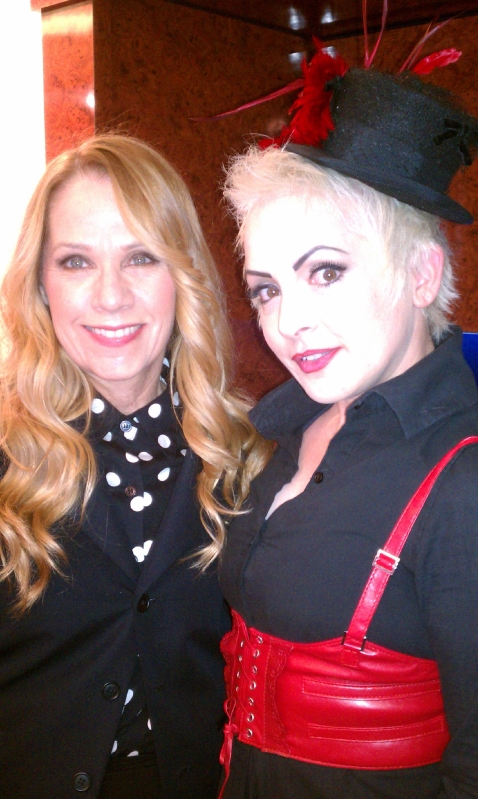 The Clockwork Couture top hat Jane wore on DWTS is up for bids now on E-bay.
The Clockwork Couture top hat Jane wore on DWTS is up for bids now on E-bay.
100% goes to Animal Acres.
But For The Grace of God
Jane visited Gibson offices in NYC and performed a little ditty you might know called But For The Grace of God. 🙂
Jane at The Iridium
AGN Photo took some really fantastic pics of Jane performing at The Iridium! 🙂

